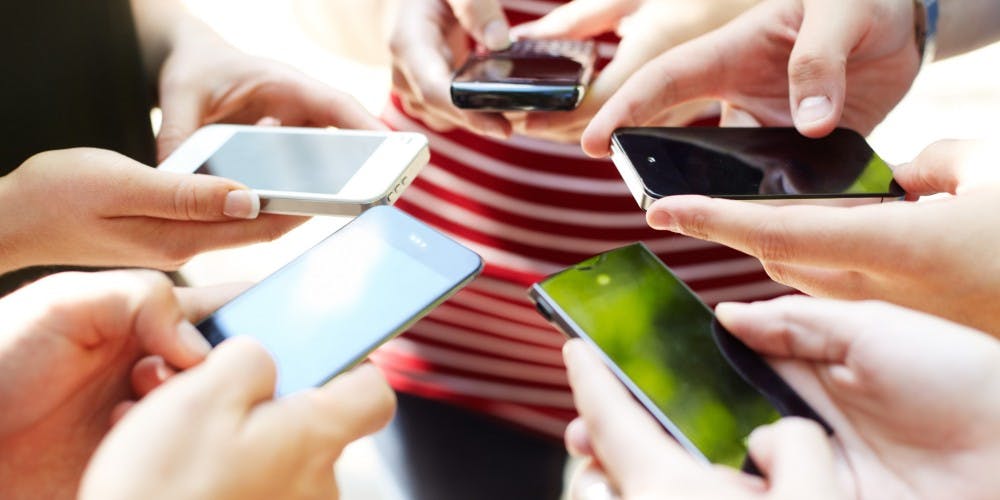This past summer, I volunteered to drive a group of middle-schoolers to a trampoline gym on a church-sponsored outing. Before departing with five seventh-grade girls and one eighth-grade boy, I recalled my own prepubescent crew of comrades. I remembered our incessant shenanigans and relentless jockeying for female attention, and began to question my original motivation to volunteer.
My trepidation vanished within the first five minutes of the drive, with the aid of the most distracting device the world has ever seen: the smartphone. Every kid had a smartphone in hand and was recording, playing, Snapchatting, e-mailing, Facebook-ing, Twittering, Instagramming or whatever-else-ing for the entire ride. It was strange to see iPhones in the hands of 11-year-olds, as I was given my first cell phone — a flip — my sophomore year of high school, and didn’t acquire a smartphone until my junior year of college.
Their Snapchatting ability was nothing short of miraculous. When we got to the trampoline gym the little buggers all showed me their “My Stories,” which had each accumulated at least 30 different pictures, some of which were of me. Instagram posts and Facebook statuses had been updated and re-updated to keep their friends cognizant of every moment of their chronology.
After the trampoline gym, we caravanned over to a nearby restaurant for dinner. I sat with my car crew, plus two other girls who rode up in a different vehicle. If they weren’t holding a burger, their fingers were wrapped around their unconditionally dependable devices. There was no conversation. Eyes were glued to screens. I realized there was something seriously wrong here.
It's time we make some kind of collective societal change to rectify this smartphone obsession. The Merriam-Webster definition of addiction is "a strong and harmful need to regularly have something (such as a drug) or do something (such as gamble)." While you don't shoot up an iPhone or wager Samsung Galaxies in casinos, there are certainly some parallels between people’s dependencies on smartphones, drugs and gambling. If you disagree, think about your preteen niece or your 16-year-old brother. They could make it through a day without their smartphone, or maybe even a week, but going through an extended length of time would be an unimaginable tragedy.
If you talk to an addiction psychologist or specialist, they'll offer what I believe is a more appropriate definition for the epidemic we're dealing with: "Addiction is the continued repetition of a behavior despite adverse consequences, or a neurological impairment leading to such behaviors." The greatest problem is that people do not see the "adverse consequences" that occur from their smartphone infatuation. These devices have become so deeply embedded in our everyday lives that their negative effects are no longer noticed.
Adults control their own purchases and habits, and should be entitled to use a smartphone as they see fit, but our youth rely wholly on parents to acquire things such as phones. To protect them from this addiction, I believe we need a national mandate, perhaps even a regulatory constitutional amendment.
This is not a new concept, and we are not too far gone to enact a meaningful change.
Nationwide prohibition began in the 1920s when some kind of moral standard realized a booze-less America. Indeed, the roaring 20s were certainly hectic, but it set the groundwork to regulate the consumption and distribution of alcohol. Today we have a national legal drinking age of 21, and many people argue that the age should be lessened. But it is generally agreed that a drinking age, regardless of the specific number, is a good thing for the youth of our country.
It took us a while longer to figure out cigarettes, but in 1998 we recognized a legal purchasing age for smokes in all 50 states. Forty-six states agreed that 18 was a reasonable age, and the other four settled on 19. The general idea was to deter older high-school students from buying cigarettes for younger ones. Our national- and state-level leadership felt the lungs and hearts of American youths were worth preserving.
So what does America risk by not intervening in the smartphone addiction?
It is certainly less of a health concern than alcohol or cigarettes (although I believe young kids should be outside scraping their knees instead of inside scraping their corneas), but it is more of a developmental issue, a lapse in learning some basic civil decencies. One of the most obvious — going back to my middle-schooler restaurant experience — is basic table manners. Sharing a meal used to require eye contact, general conversational decorum, moderately functional attention spans and the ability to recognize and enjoy moments in isolation. Now, all it requires is a full battery and the Angry Birds app.
Enjoy what you're reading?
Signup for our newsletter
The smartphone is an amazing tool that has redefined the way we go through everyday life. I consent that without them, college students, professors and professionals could not function as efficiently.
But why does anyone under the age of 16 need a smartphone? Younger kids should be able to call their friends or parents as needed, which can be easily achieved with a normal flip phone. Putting a smartphone in their hands is a disservice to them. As they mature alongside their iPhone or Android, they become neurologically dependent upon it, until their happiness becomes bound to a four-inch screen.
Each new generation is scrutinized by the generations that preceded it. As society and culture change, so do the people living in it. But the smartphone addiction is not even in the hands of the kids suffering from it. No 13-year-old has the cash flow to pay for unlimited data, or a driver’s license to hit the nearest Verizon store.
National mandate and constitutional amendment hyperbole aside, think about the implications of buying your kid a smartphone. Take a minute to think about his future. That four-inch screen will certainly make him a better texter and a more efficient Facebook-er, but he may forget about the whole eye-contact thing at the dinner table.
Contact Collegian reporter Clay Helms at clay.helms@richmond.edu
Support independent student media
You can make a tax-deductible donation by clicking the button below, which takes you to our secure PayPal account. The page is set up to receive contributions in whatever amount you designate. We look forward to using the money we raise to further our mission of providing honest and accurate information to students, faculty, staff, alumni and others in the general public.
Donate Now



